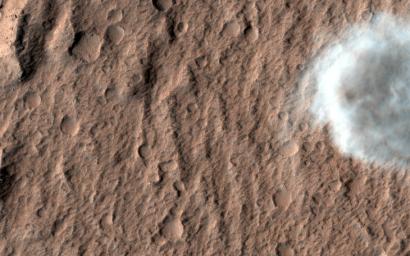
|
A Dust Devil on Hilly Terrain
- Click the image above for a larger view
- Full-Res JPEG (2880 x 1800) (967.1 kB)
- Full-Res TIFF (2880 x 1800) (15.6 MB)
Caption:

Map Projected Browse Image
Click on the image for larger version
There are many dust devils on Mars -- little twisters that raise dust from the surface. They have also cleaned dust off of the solar panels of the rovers Opportunity and Spirit, improving the solar power production. (Spirit became stuck in 2009 and ceased communication a year later.)
HiRISE sees many dust-devil tracks on Mars, but rarely captures an active feature because the images cover such small areas and because the typical time of day near 3 p.m. is past the peak heating and dust-devil activity. In this 2008 image in the Amazonis region , we got lucky, although not lucky enough to capture the whole swirl in the color strip.
The map is projected here at a scale of 25 centimeters (9.8 inches) per pixel. [The original image scale is 29.5 centimeters (11.6 inches) per pixel (with 1 x 1 binning) to 58.9 centimeters (23.2 inches) per pixel (with 2 x 2 binning)]. North is up.
Background Info:
The University of Arizona, Tucson, operates HiRISE, which was built by Ball Aerospace & Technologies Corp., Boulder, Colo. NASA's Jet Propulsion Laboratory, a division of Caltech in Pasadena, California, manages the Mars Reconnaissance Orbiter Project for NASA's Science Mission Directorate, Washington.
Cataloging Keywords:
| Name | Value | Additional Values |
|---|---|---|
| Target | Mars | |
| System | ||
| Target Type | Planet | |
| Mission | Mars Reconnaissance Orbiter (MRO) | Mars Exploration Rover (MER) |
| Instrument Host | Mars Reconnaissance Orbiter | Opportunity (MER-B), Spirit (MER-A) |
| Host Type | Orbiter | Rover |
| Instrument | High Resolution Imaging Science Experiment (HiRISE) | |
| Detector | ||
| Extra Keywords | Color, Dust, Map | |
| Acquisition Date | ||
| Release Date | 2017-02-15 | |
| Date in Caption | ||
| Image Credit | NASA/JPL-Caltech/Univ. of Arizona | |
| Source | photojournal.jpl.nasa.gov/catalog/PIA21457 | |
| Identifier | PIA21457 | |
